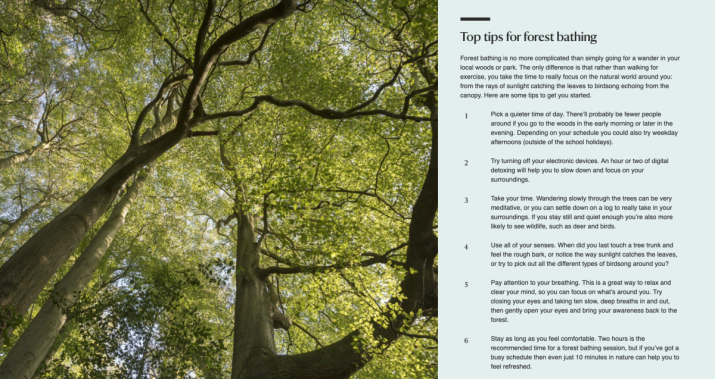NEWS
New UK Study Highlights the Benefits of Forest Bathing

Immersing oneself in the soothing sounds of a forest or woodland, a practice popularly known as “forest bathing,” is measurably more effective for relaxation than using a meditation app, a new study supported by Britain’s National Trust suggests.
According to the results of the study, published yesterday, which measured reaction times and subsequent behavioral responses to sensory stimuli, soaking up the sounds of woodland nature resulted in significant improvement in relaxation, with a 30 per cent increase in feelings of relaxation among the study participants, compared with no change for those listening to a voiced meditation app.
“The crunch of snapping twigs underfoot. Lilting birdsong from above. The rustling of trees in the breeze. Woodland sounds have been shown to have a direct impact on our wellbeing, making us more relaxed, less stressed and less anxious,” the National Trust said in a release announcing the study. (National Trust)
The National Trust, formally the National Trust for Places of Historic Interest or Natural Beauty, is a British charity founded in 1895 and dedicated to conserving historical and environmental heritage in England, Northern Ireland, and Wales, including 26,000 hectares of woodland, composed of some 12 million trees. Its Scottish counterpart is the National Trust for Scotland.
 Data from the National Trust for Places of Historic Interest or Natural Beauty
Data from the National Trust for Places of Historic Interest or Natural BeautyWhile the study, which gathered data from 600 respondents, indicated that forest bathing is also an effective means for reducing stress and anxiety levels, the results showed that listening to a guided meditation app still produced superior results in this regard. Forest bathing reduced stress levels by 24 per cent and anxiety by 19 per cent, compared with 39 per cent and 47 per cent, respectively, for prerecorded guided meditation.
“Sometimes a simple walk in woodlands, where you’re surrounded by the echoes of calling birds, and that satisfying crunch of fallen leaves and twigs underfoot, is the perfect remedy for reducing stress,” said Patrick Begg, the trust’s director of outdoors and natural resources. (National Trust)
The study is part of a National Trust research initiative that examines “the importance of special places and their impact on well-being, with previous research highlighting how on average, those with a place of significant importance in their lives report higher levels of happiness, life satisfaction and even generosity.” (National Trust)
“There is a large body of scientific evidence demonstrating that experience of nature can benefit health and well-being, including recovery from everyday psychological stress,” said Dr. Eleanor Ratcliffe, lecturer in environmental psychology at the University of Surrey. “Much of this research has focused on visual experiences, but more recent work has shown that the sounds of the outdoors, such as birdsong, wind, and water, can also improve mood and reduce stress. These sounds offer a way to connect with nature no matter where you are.” (National Trust)
Additional research on behalf of the National Trust involving 2,000 British adults indicated that birdsong is the most widely preferred woodland sound, with almost 40 per cent of the respondents stating that hearing their favorite woodland sounds made them happier.
“Sometimes,” the National Trust’s Begg observed, “a simple walk in woodlands, where you’re surrounded by the echoes of calling birds, and that satisfying crunch of fallen leaves and twigs underfoot, is the perfect remedy for reducing stress.” (National Trust)
“Forest bathing” is a translation of the Japanese term shinrin-yoku, which first came to prominence during the 1980s, when it was promoted in Japan as a means of preventative healthcare and healing. A number of researchers—mainly in Japan and South Korea—have produced a substantial body of scientific research and studies on the restorative and rejuvenating physiological and psychological benefits of regular mindful immersion in a forest environment.
 From nationaltrust.org.uk (click to enlarge)
From nationaltrust.org.uk (click to enlarge)See more
Woodland sounds boost wellbeing, according to new study (National Trust)
National Trust
National Trust for Scotland
Related news from Buddhistdoor Global
Reindeer Yoga in Alaska: The Latest Twist in a Growing Phenomenon
Mindfulness Trials Rolled Out at Hundreds of Schools in England
Japanese Monk Promotes Cleaning as a Path to Well-being
Buddhism the Fastest-growing Religion in Scottish and English Prisons
What’s Ailing You? How Modern Life May Be Making Us Ill
Related features from Buddhistdoor Global
How to Enjoy Life Twice as Much, Part 1: Michel de Montaigne and Rick Hanson on Life’s Natural Pleasures
Healing Body and Mind: Reconnecting with the Wisdom of Medicinal Plants
Mindfulness Practice in Japanese Stroll Gardens
Lilac Meditation














